Western Front: In the Channel Islands, Jersey surrenders on 1 July 1940 and is occupied. The occupation of Guernsey continues. Albrecht Lanz is confirmed as the military governor. Communications between the Channel Islands and England are severed.
French Marshal Philippe Pétain reaffirms to US Ambassador William C. Bullitt that French ships will be scuttled before they are handed over to the Kriegsmarine. Admiral Darlan later says that the ships have been ordered to sail to the Mediterranean if placed in jeopardy from the Germans, or scuttled if necessary.
The Petain French government, after a brief stop-over in Clermont-Ferrand, moves to the spa town of Vichy. This is due to the town's nearness to Paris on the railway and because it has a lot of free hotel space. It also has the advantage of modern telephone exchanges for its upscale visitors, which come in handy for controlling the government. This move is the origination of the term Vichy France, which has become a sort of synonym for traitorous and repressive collaboration. The town is immediately swarmed with visitors and Frenchmen looking for jobs.
European Air Operations: The Luftwaffe bombs Wick and Hill during the day. There are 12 killed, 22 injured. This is part of the campaign of strategic bombing of industrial centers.
The RAF sends a dozen Hampden bombers against Kiel naval base. One of the pilots is Guy Gibson, who gets a near-miss against the Scharnhorst with a 2,000 lb bomb. Two small bombs hit the Prinz Eugen.
More transfers of Luftwaffe units for rest and refit. There also are several moves of elite units since the French threat has disappeared. The Luftwaffe is reshuffling and reorganizing in order to prepare for the test that Air Minister Hermann Goering already has set out for it.
III/JG26 moves from Munchen-Gladbach to Doberitz to protect Berlin while victory celebrations are in progress.
II/JG2 moves to Frankfurt/Rhein-Main.
Erprobungsgruppe (Epr.Gr) 210 (Test Wing 210) forms at Köln-Ostheim. It is formed using Bf 109s and Bf 110s from other units.
Stab/KG 40 forms at Bordeaux-Merignac to operate Fw 200 4-engine bombers.
The formation of night-fighting units continues at Deelen-Arnhem and Munchen-Gladbach airfields.
Battle of Britain: General Jodl of the General Staff (OKW) discusses the possibility of an invasion of England. This is projected Operation Sealion (Seelöwe).
Battle of the Atlantic: Several U-boats have congregated in the same general area about 300 miles west of France. They spot the same convoy and achieve numerous victories today. However, it turns into a bad day for the U-boats as two of them go under.
U-30 (Kapitänleutnant Fritz-Julius Lemp) sinks 5,218 ton British MV Beignon at 04:00. There are six deaths and 111 survivors in total; the Beignon had rescued some of the crew from the sunk Avelona Star, and 3 of them are killed and 81 survive this second sinking.
U-102 (Kapitänleutnant Harro von Klot-Heydenfeldt) torpedoes and sinks 5,219-ton British freighter SS Clearton, with 8 crewmen perishing and 26 surviving.
British destroyer HMS Vansittart then sinks U-102 with depth charges, with all 43 hands lost.
U-65 (Kapitänleutnant Hans-Gerrit von Stockhausen) sinks 8,156-ton Dutch freighter SS Amstelland, with one crewman perishing and 39 surviving.
U-29 (Kapitänleutnant Otto Schuhart) sinks 7,466 ton Greek freighter Adamastos. All 25 aboard survive.
U-26 (Kapitänleutnant Heinz Scheringer) torpedoes and damages 4,871 ton British freighter Zarian.
British corvette Gladiolus then depth charges U-26 and forces it to the surface, where RAAF Flight Leader W.N. Gibson (no relation to Guy) bombs it from a Short Sunderland Flying Boat. Heavily damaged, the U-boat is scuttled and all 48 crew survive and become POWs. Gibson receives the DFC for this action.
German raider Thor captures Dutch freighter Kertosono, then sends it to France with a prize crew.
Convoy OA 177G departs from Southend, Convoy OB 177 departs from Liverpool, Convoy SL 38 departs from Freetown.
Destroyer HMS Garth (L 20) and Minesweeping trawler HMS Deodar (T 124, G. Mair) are commissioned.
Battle of the Mediterranean: Admiral Somerville in command of Force H receives orders to commence Operation Catapult, the destruction of the French fleet, on 3 July.
The British War Office sends Governor Dobbie a telegram:
The island of Malta remains tense about potential spies and saboteurs. There are no air raid alerts today, though.
North Africa: Rodolfo Graziani is formally named the new Italian Governor-General of Italian Libya, replacing the deceased Italo Balbo.
The RAF launches raids against Abyssinia, particularly the airfield at Gondar.
The British move the 2nd Battalion of the Black Watch Regiment from Egypt to Aden.
Italian forces in Abyssinia attack the 1st Battalion of the King's Africa Rifles in Moyale.
Romanian/Hungarian Relations: The two countries mass troops along their borders as tensions heighten over Hungarian demands for Romanian territory. Hungary, in an echo of past allegations of "provocations" by Germany and the Soviet Union, claims border violations by Romania.
Anglo/German Relations: The British Foreign Office warns Germany about occupying Syria. British troops are prepared to invade Syria from Palestine and Egypt due to the local commander's vow to remain loyal to Vichy France.
Anglo/Soviet Relations: Sir Stafford Cripps delivers a message to Stalin from Winston Churchill which expresses a desire for closer relations. The USSR remains a nominal ally of Germany, and Stalin has been pursuing an expansionist foreign policy himself lately.
Anglo/US Relations: US Ambassador to the Court of St. James Joseph Kennedy warns Winston Churchill that the feeling is that Great Britain is beaten and that Hitler will be in London by 15 August.
Anglo/Italian Relations: Mussolini warns the British about using Greek waters for the Royal Navy and demands that this stop or he will invade Greece from Albania.
German/US Relations: The German Foreign Ministry responds to the US diplomatic note of 18 June warning against interference in the Americas:
US Government: The US Navy issues $30 million in contracts for the construction of 44 new ships and naval facilities.
The Headquarters Marine Aircraft Wing, Fleet Marine Force comes into being in San Diego. The first commander is Brigadier General Ross E. Rowell.
Retired officer James H. Doolittle is recalled to service with US Army Air Corps. His new rank is Major. Major Doolittle's first mission is to help US car manufacturers switch over to aircraft production.
Romania: The Soviet Union completes its occupation of areas demanded from Romania.
The government renounces its defense treaties (April 13, 1939) with England and France, which it believes are worthless guarantees, particularly after the recent Soviet occupation of its territory. Henceforward, its allegiance is with a country that can actually make a difference: Germany.
Soviet Union: Joseph Stalin tells his ambassador to Tokyo that the 23 August 1939 Ribbentrop/Molotov Pact was dictated by the desire to unleash war in Europe." If so, he certainly succeeded.
Japanese Military: The first Mitsubishi A6M Zero fighters (pre-series of 15 A6M2) become operational with the 12th Rengo Kōkūtai in July 1940.
China: At the Battle of South Kwangsi, the Japanese 22nd Army continues moving toward Lungchin.
Evacuations of British non-essentials is in progress from Hong Kong.
Australia: General Sturdee assumes command of the Australian 8th Infantry Division.
Japanese Homefront: Rationing of sugar and matches.
June 1940
June 1, 1940: Devastation at Dunkirk
June 2, 1940: Hitler Visits France
June 3, 1940: Operation Paula
June 4, 1940: We Shall Fight
June 5, 1940: Fall Rot
June 6, 1940: Weygand Line Crumbling
June 7, 1940: British Evacuating Narvik
June 8, 1940: Operation Juno
June 9, 1940: Norway Capitulates
June 10, 1940: Mussolini Throws Down
June 11, 1940: Paris an Open City
June 12, 1940: Rommel at St. Valery
June 13, 1940: France Goes Alone
June 14, 1940: Paris Falls
June 15, 1940: Soviets Scoop Up Lithuania
June 16, 1940: Enter Pétain
June 17, 1940: The Lancastria Sinks
June 18, 1940: A Day of Leaders
June 19, 1940: U-boats Run Wild
June 20, 1940: Pétain Wilts
June 21, 1940: Hitler's Happiest Day
June 22, 1940: France Is Done
June 23, 1940: Hitler in Paris
June 24, 1940: Six Million Jews
June 25, 1940: German Celebrations
June 26, 1940: USSR Being Belligerent
June 27, 1940: Malta in Peril
June 28, 1940: Channel Islands Bombed
June 29, 1940: Gandhi Insists on Independence
June 30, 1940: Channel Islands Occupied
July 1940
July 1, 1940: Vichy France
July 2, 1940: Arandora Star
July 3, 1940: Operation Catapult at Mers El Kébir
July 4, 1940: Romania In Crisis
July 5, 1940: The Five Freedoms
July 6, 1940: Hitler's High Point
July 7 1940: Dakar And Ringo
July 8, 1940: Tea Rationing in England
July 9, 1940: Battle of Calabria
July 10, 1940: Battle of Britain Begins
July 11, 1940: "Nous, Philippe Petain"
July 12, 1940: Enter Laval
July 13, 1940: German Surface Raiders Attack!
July 14, 1940: Bastille/Mourning Day
July 15, 1940: Tallest Man Dies
July 16, 1940: Plans for Sea Lion
July 17, 1940: Burma Road Closed
July 18, 1940: FDR Runs Again
July 19, 1940: Last Appeal To Reason
July 20, 1940: First Night Fighter Victory
July 21, 1940: Soviets Absorb Baltic States
July 22, 1940: First RAF Night Fighter Victory
July 23, 1940: Invasion False Alarm
July 24, 1940: The Meknés Incident
July 25, 1940: Black Thursday for RAF
July 26, 1940: Capture The Duke?
July 27, 1940: What's Up, Doc?
July 28, 1940: Destroyers Pulled From Dover
July 29, 1940: Barbarossa On The Burner
July 30, 1940: Hitler Delays Sealion
July 31, 1940: Bloody Wednesday of Olkusz
2020
French Marshal Philippe Pétain reaffirms to US Ambassador William C. Bullitt that French ships will be scuttled before they are handed over to the Kriegsmarine. Admiral Darlan later says that the ships have been ordered to sail to the Mediterranean if placed in jeopardy from the Germans, or scuttled if necessary.
The Petain French government, after a brief stop-over in Clermont-Ferrand, moves to the spa town of Vichy. This is due to the town's nearness to Paris on the railway and because it has a lot of free hotel space. It also has the advantage of modern telephone exchanges for its upscale visitors, which come in handy for controlling the government. This move is the origination of the term Vichy France, which has become a sort of synonym for traitorous and repressive collaboration. The town is immediately swarmed with visitors and Frenchmen looking for jobs.
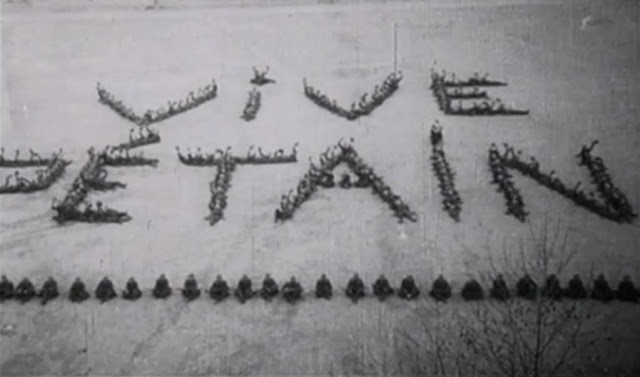 |
| Marshal Petain was quite popular in France in his time. |
The RAF sends a dozen Hampden bombers against Kiel naval base. One of the pilots is Guy Gibson, who gets a near-miss against the Scharnhorst with a 2,000 lb bomb. Two small bombs hit the Prinz Eugen.
More transfers of Luftwaffe units for rest and refit. There also are several moves of elite units since the French threat has disappeared. The Luftwaffe is reshuffling and reorganizing in order to prepare for the test that Air Minister Hermann Goering already has set out for it.
III/JG26 moves from Munchen-Gladbach to Doberitz to protect Berlin while victory celebrations are in progress.
II/JG2 moves to Frankfurt/Rhein-Main.
Erprobungsgruppe (Epr.Gr) 210 (Test Wing 210) forms at Köln-Ostheim. It is formed using Bf 109s and Bf 110s from other units.
Stab/KG 40 forms at Bordeaux-Merignac to operate Fw 200 4-engine bombers.
The formation of night-fighting units continues at Deelen-Arnhem and Munchen-Gladbach airfields.
 |
| German marching band troops marching into the Channel Islands. |
Battle of the Atlantic: Several U-boats have congregated in the same general area about 300 miles west of France. They spot the same convoy and achieve numerous victories today. However, it turns into a bad day for the U-boats as two of them go under.
U-30 (Kapitänleutnant Fritz-Julius Lemp) sinks 5,218 ton British MV Beignon at 04:00. There are six deaths and 111 survivors in total; the Beignon had rescued some of the crew from the sunk Avelona Star, and 3 of them are killed and 81 survive this second sinking.
U-102 (Kapitänleutnant Harro von Klot-Heydenfeldt) torpedoes and sinks 5,219-ton British freighter SS Clearton, with 8 crewmen perishing and 26 surviving.
British destroyer HMS Vansittart then sinks U-102 with depth charges, with all 43 hands lost.
U-65 (Kapitänleutnant Hans-Gerrit von Stockhausen) sinks 8,156-ton Dutch freighter SS Amstelland, with one crewman perishing and 39 surviving.
U-29 (Kapitänleutnant Otto Schuhart) sinks 7,466 ton Greek freighter Adamastos. All 25 aboard survive.
U-26 (Kapitänleutnant Heinz Scheringer) torpedoes and damages 4,871 ton British freighter Zarian.
British corvette Gladiolus then depth charges U-26 and forces it to the surface, where RAAF Flight Leader W.N. Gibson (no relation to Guy) bombs it from a Short Sunderland Flying Boat. Heavily damaged, the U-boat is scuttled and all 48 crew survive and become POWs. Gibson receives the DFC for this action.
German raider Thor captures Dutch freighter Kertosono, then sends it to France with a prize crew.
Convoy OA 177G departs from Southend, Convoy OB 177 departs from Liverpool, Convoy SL 38 departs from Freetown.
Destroyer HMS Garth (L 20) and Minesweeping trawler HMS Deodar (T 124, G. Mair) are commissioned.
Battle of the Mediterranean: Admiral Somerville in command of Force H receives orders to commence Operation Catapult, the destruction of the French fleet, on 3 July.
The British War Office sends Governor Dobbie a telegram:
Regret impossible at present to send any fighters but consideration is being given.In its message, the Admiralty admits that the Mediterranean is now off-limits to Royal Navy carriers.
The island of Malta remains tense about potential spies and saboteurs. There are no air raid alerts today, though.
North Africa: Rodolfo Graziani is formally named the new Italian Governor-General of Italian Libya, replacing the deceased Italo Balbo.
The RAF launches raids against Abyssinia, particularly the airfield at Gondar.
The British move the 2nd Battalion of the Black Watch Regiment from Egypt to Aden.
Italian forces in Abyssinia attack the 1st Battalion of the King's Africa Rifles in Moyale.
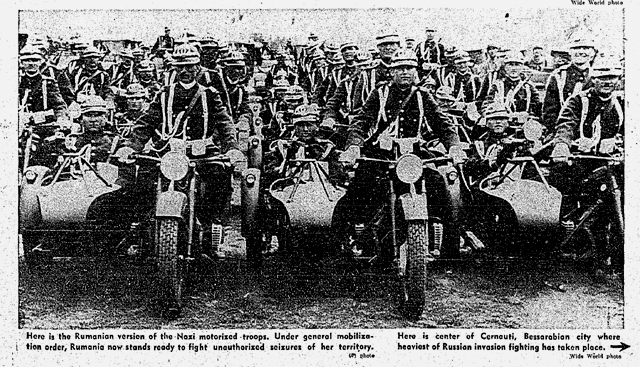 |
| Romanian motorcycle soldiers, as seen in the LA Times, 1 July 1940. |
Anglo/German Relations: The British Foreign Office warns Germany about occupying Syria. British troops are prepared to invade Syria from Palestine and Egypt due to the local commander's vow to remain loyal to Vichy France.
Anglo/Soviet Relations: Sir Stafford Cripps delivers a message to Stalin from Winston Churchill which expresses a desire for closer relations. The USSR remains a nominal ally of Germany, and Stalin has been pursuing an expansionist foreign policy himself lately.
Anglo/US Relations: US Ambassador to the Court of St. James Joseph Kennedy warns Winston Churchill that the feeling is that Great Britain is beaten and that Hitler will be in London by 15 August.
Anglo/Italian Relations: Mussolini warns the British about using Greek waters for the Royal Navy and demands that this stop or he will invade Greece from Albania.
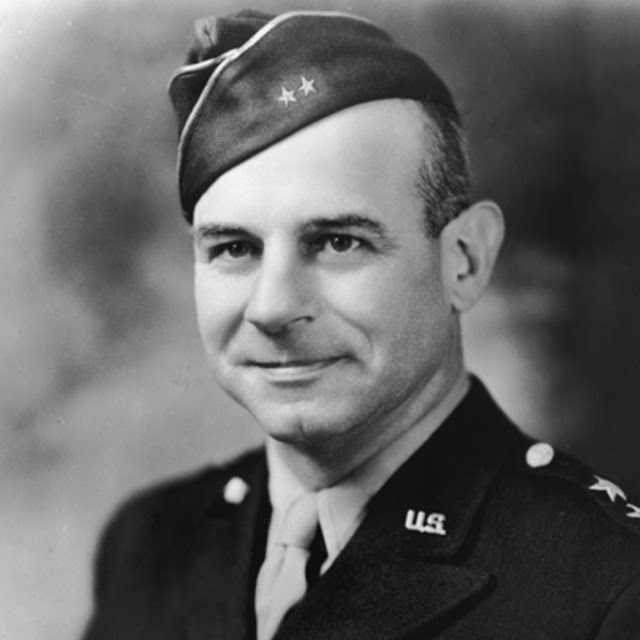 |
| US Major Jimmy Doolittle. |
The German Reich . . . has given no occasion whatever for the assumption that it intends to acquire such possessions, . . . the nonintervention in the affairs of the American Continent by European nations which is demanded by the Monroe Doctrine can in principle be legally valid only on condition that the American nations for their part do not interfere in the affairs of the European Continent.The German Foreign Ministry requests that the US withdraw its ambassadors from Belgium, the Netherlands, Norway, and Luxembourg. Ambassadors to Berlin will suffice now.
US Government: The US Navy issues $30 million in contracts for the construction of 44 new ships and naval facilities.
The Headquarters Marine Aircraft Wing, Fleet Marine Force comes into being in San Diego. The first commander is Brigadier General Ross E. Rowell.
Retired officer James H. Doolittle is recalled to service with US Army Air Corps. His new rank is Major. Major Doolittle's first mission is to help US car manufacturers switch over to aircraft production.
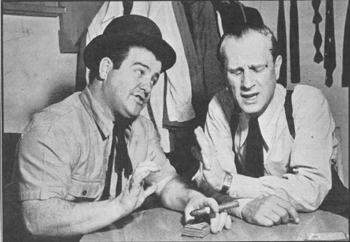 |
| Abbott and Costello, taken from Newsweek of 1 July 1940. |
The government renounces its defense treaties (April 13, 1939) with England and France, which it believes are worthless guarantees, particularly after the recent Soviet occupation of its territory. Henceforward, its allegiance is with a country that can actually make a difference: Germany.
Soviet Union: Joseph Stalin tells his ambassador to Tokyo that the 23 August 1939 Ribbentrop/Molotov Pact was dictated by the desire to unleash war in Europe." If so, he certainly succeeded.
Japanese Military: The first Mitsubishi A6M Zero fighters (pre-series of 15 A6M2) become operational with the 12th Rengo Kōkūtai in July 1940.
China: At the Battle of South Kwangsi, the Japanese 22nd Army continues moving toward Lungchin.
Evacuations of British non-essentials is in progress from Hong Kong.
Australia: General Sturdee assumes command of the Australian 8th Infantry Division.
Japanese Homefront: Rationing of sugar and matches.
French Homefront: The farming area north of Paris, which is occupied by the Wehrmacht, has lost most of its inhabitants to the south. Crops are said to be untended and farm animals on the loose. There remain many unburied corpses.
American Homefront: Abbott and Costello take over a time slot given up by Fred Allen on NBC Red Network.
The Tacoma Narrows Bridge opens in the State of Washington. It is the third-largest suspension bridge in the world.
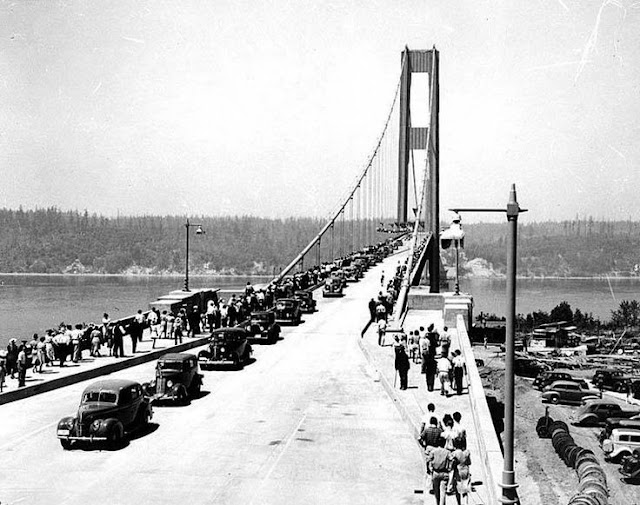 |
| The Tacoma Narrows Bridge, opening day, 11:00, 1 July 1940. |
June 1940
June 1, 1940: Devastation at Dunkirk
June 2, 1940: Hitler Visits France
June 3, 1940: Operation Paula
June 4, 1940: We Shall Fight
June 5, 1940: Fall Rot
June 6, 1940: Weygand Line Crumbling
June 7, 1940: British Evacuating Narvik
June 8, 1940: Operation Juno
June 9, 1940: Norway Capitulates
June 10, 1940: Mussolini Throws Down
June 11, 1940: Paris an Open City
June 12, 1940: Rommel at St. Valery
June 13, 1940: France Goes Alone
June 14, 1940: Paris Falls
June 15, 1940: Soviets Scoop Up Lithuania
June 16, 1940: Enter Pétain
June 17, 1940: The Lancastria Sinks
June 18, 1940: A Day of Leaders
June 19, 1940: U-boats Run Wild
June 20, 1940: Pétain Wilts
June 21, 1940: Hitler's Happiest Day
June 22, 1940: France Is Done
June 23, 1940: Hitler in Paris
June 24, 1940: Six Million Jews
June 25, 1940: German Celebrations
June 26, 1940: USSR Being Belligerent
June 27, 1940: Malta in Peril
June 28, 1940: Channel Islands Bombed
June 29, 1940: Gandhi Insists on Independence
June 30, 1940: Channel Islands Occupied
July 1940
July 1, 1940: Vichy France
July 2, 1940: Arandora Star
July 3, 1940: Operation Catapult at Mers El Kébir
July 4, 1940: Romania In Crisis
July 5, 1940: The Five Freedoms
July 6, 1940: Hitler's High Point
July 7 1940: Dakar And Ringo
July 8, 1940: Tea Rationing in England
July 9, 1940: Battle of Calabria
July 10, 1940: Battle of Britain Begins
July 11, 1940: "Nous, Philippe Petain"
July 12, 1940: Enter Laval
July 13, 1940: German Surface Raiders Attack!
July 14, 1940: Bastille/Mourning Day
July 15, 1940: Tallest Man Dies
July 16, 1940: Plans for Sea Lion
July 17, 1940: Burma Road Closed
July 18, 1940: FDR Runs Again
July 19, 1940: Last Appeal To Reason
July 20, 1940: First Night Fighter Victory
July 21, 1940: Soviets Absorb Baltic States
July 22, 1940: First RAF Night Fighter Victory
July 23, 1940: Invasion False Alarm
July 24, 1940: The Meknés Incident
July 25, 1940: Black Thursday for RAF
July 26, 1940: Capture The Duke?
July 27, 1940: What's Up, Doc?
July 28, 1940: Destroyers Pulled From Dover
July 29, 1940: Barbarossa On The Burner
July 30, 1940: Hitler Delays Sealion
July 31, 1940: Bloody Wednesday of Olkusz
2020

No comments:
Post a Comment